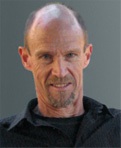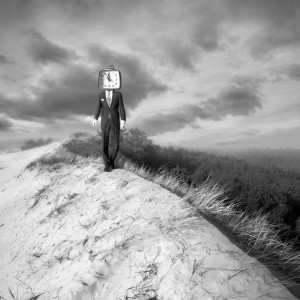
Mary Akers: Thank you for sharing your wonderful short story On the Verge of Frog-Hood with us. Can you tell our readers a little bit about what inspired this fascinating story?
Richard Bader: One day a couple of years ago a woman came to my door trying to sell a novel that she self-published. I was very busy and I blew her off. Not rudely, but still. And I’ve always felt really bad about that. Though maybe it was a good thing, because it gave me the opportunity to try to figure out who she was. And yes, there once was a woman who collected tadpoles from the cover of a neighbor’s pool. No one ever talked to her, and she didn’t look like she wanted to be talked to. She seemed very sad. So I got to invent her, too.
MA: How do you generally write? (On a computer? Pen to paper? Mornings? Anytime?)
RB: The lion’s share of my writing happens on an aging Mac laptop in my basement office. The space is sort of sensory-deprivation chic, though it may be a little lacking in the chic department. The absence of stimuli helps keep me from getting too distracted. Plus it’s warm in the winter and cool in the summer. I have an office assistant named Zoe who’s a 3-year-old German Shepherd mix and an awesome listener. Outside the office I try to keep a pen and small notebook handy in case an idea strikes, or I’ll use a note-taking app on my iPhone. I have mixed success keeping to a fixed writing schedule. I envy write-first-thing-in-the-morning writers, but I’m generally more productive in the afternoon.
MA: What inspires you?
RB: A jacket blurb I saw recently on a book by a writer I like said she puts ordinary people in extraordinary circumstances to see what they’re made of. I needed somebody else to put it that way, but I think most of the time when I write that’s what I’m trying to do. That said, I also feel an itch to write a good story about a superhero. Of course, like all good superheroes, he (or she) would have to be a flawed superhero, with those humanizing ordinary-person traits.

MA: Who are your favorite writers?
RB: Most of what I read is contemporary fiction, and I tend to hop around a lot. The last book that made me feel like I was in the presence of greatness was Colum McCann’s Let the Great World Spin. The last book I didn’t want to see end was The Art of Fielding, by Chad Harbach. I’m a big Jennifer Egan fan,and I like the way she’s always experimenting — a recent story she wrote with Twitter feeds was a lot of fun. A volume of Amy Hempel short stories is a fixture on my bedside table. I pick it up and read every now and then and shake my head and wonder at how in the world she does it. An Alice Munro collection is there, too. Not long ago I stumbled on Doug Dorst’s excellent story collection The Surf Guru, and wish he’d produce another. I tend to value story over incredibly gorgeous language to tell story, and this drives who I like to read.
MA: Good choices! Those are some of my favorites, too.
And finally, because we are a recovery-themed journal, what does “recovery” mean to you?
RB: I grew up in a household where alcoholism was a dominant theme. Probably the dominant theme. But recovery never really happened. So maybe recovery is something I’m still looking for. What does it take to do it? What are the obstacles? Why do some people succeed and others fail? What keeps others on a perpetual succeed/fail cycle? My guess is that if I really looked at it, I’d find a recovery theme in just about everything I write. This brings us back to what I said before about putting ordinary people in extraordinary circumstances and seeing what they’re made of. Some make it. Others don’t.
MA: Thanks so much for talking with me, Richard. I really enjoyed it.

Pingback: On the Verge of Frog-Hood | Rkvry Quarterly Literary Journal
Pingback: On the Verge of Frog-Hood | Rkvry Quarterly Literary Journal
Pingback: “On the Verge of Frog-Hood” by Richard Bader | Rkvry Quarterly Literary Journal